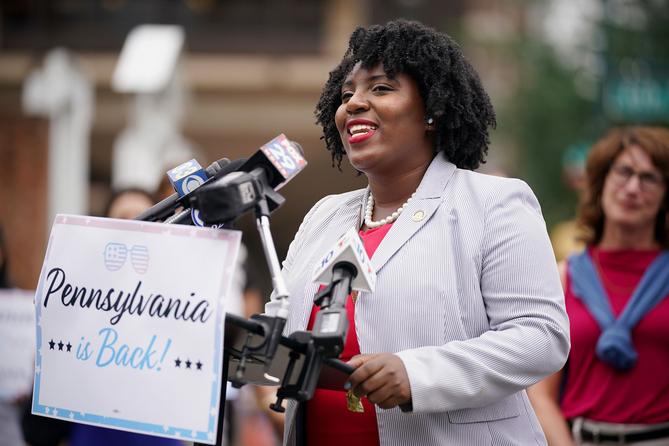Spotlight PA is an independent, nonpartisan newsroom powered by The Philadelphia Inquirer in partnership with PennLive/The Patriot-News, TribLIVE/Pittsburgh Tribune-Review, and WITF Public Media. Sign up for our free newsletters.
HARRISBURG — One of the biggest classes of first-time lawmakers in recent memory will be sworn in to the Pennsylvania legislature as leaders in the lower chamber grapple for power, complicating incoming legislators’ expressed desires to find common ground.
Nearly 50 new members will join the state House in January, making up a quarter of the chamber. Six people will also be sworn in to the state Senate for the first time, four of who previously served as lawmakers in the lower chamber.
Among the fresh faces for the 2023-24 session are lawyers, community activists, and the first physician to join the legislature in nearly 60 years.
“I don’t ever remember this many,” said Bill DeWeese, a former Democratic state House speaker. “This is a stupendous avalanche of new representatives.”
The first-year representatives and senators were elected under brand-new legislative maps drawn during this year’s redistricting process, which created a number of districts without incumbents and set off a wave of retirements.
Those open seats provided opportunities for new blood to join the General Assembly, though many of the successful candidates first had to raise hundreds of thousands of dollars. On average, their races were some of the most expensive in state history.
The new state senators are joining a chamber that will remain under Republican control. But in the state House, first-time lawmakers are entering a chamber with a razor-thin partisan divide that is being roiled by disputes over who controls it.
Democrats won 102 seats during the November election, giving the party a one-seat majority. But because of the death of one incumbent and the resignations of two others who won different elected offices, Republicans currently have 101 seats to Democrats’ 99.
The new members will face their first major test after being sworn in on Jan. 3, when they will be asked to elect a new speaker to lead the chamber.
“A lot of us are coming in and this is causing a bad taste because we really want to get things done for our community and that includes working with the full House,” said State Rep.-elect Tarik Khan (D., Philadelphia). “We’re also trying to figure out what is Jan. 3 going to look like.”

Legislating in a divided chamber
As soon-to-be-seated state House members deal with bureaucratic tasks like finding an office and hiring staff, they’re also navigating Harrisburg’s hierarchical internal politics.
Democratic and Republican leaders are both claiming they control the chamber. State Rep. Joanna McClinton (D., Philadelphia) has said she will stand for speaker and expects all lawmakers, regardless of party, to support her as Democrats won a majority of seats in the November election.
Republican leaders, meanwhile, are playing their cards close to their chests, saying only they have a 101-99 majority. Still, at least one GOP lawmaker has said she’ll stand for speaker.
Democrats joining the state House for the first time expressed support for McClinton and denounced Republican claims to the majority despite their party winning more seats on Election Day. Their Republican counterparts echoed the party line, stating that the GOP currently has a functional majority in the state House but didn’t expand on their plans for Jan. 3.
When special elections take place (whenever that may be) to fill the three empty seats, Capitol watchers expect the 102-101 majority to return to Democrats, giving the party control for the first time in a decade.
Incoming first-time state House Democrats differ on how to handle the newfound responsibility. Some believe that the razor-thin majority will require moderation to collaborate with their Republican colleagues.
Over a dozen newly elected state House members — both Democrats and Republicans — spoke with Spotlight PA and said they could see common ground on issues such as housing accessibility, raising the minimum wage, capping insulin prices, and commonsense gun laws.
Other first-year Democrats believe that their majority is the chance to boldly push their agenda without being encumbered by their Republican counterparts.
State Rep.-elect La’Tasha Mayes (D., Allegheny) is firmly in the latter camp. Mayes, who was a community activist for 18 years prior to her election, acknowledged that the majority doesn’t give the party “carte blanche” and that collaborating with the state Senate on big-ticket items like the budget is necessary. But she called for the party to act unapologetically on issues such as abortion rights, health-care access, and LGBTQ rights.
“Your hands aren’t tied to just defending what we have won,” said Mayes. “I think there is new life, there’s new imagination, there can be greater vision for the type of legislation and policy we pass.”
First-time lawmakers in both chambers will need to garner the support of Gov.-elect Josh Shapiro, a Democrat, to see any of their bills or policy proposals cross the finish line.
State Rep.-elect Dallas Kephart (R., Clearfield) said there are areas where the legislature can collaborate with Shapiro. He pointed to Shapiro’s stance on the Regional Greenhouse Gas Initiative, a plan that requires energy producers to purchase allowances to emit carbon dioxide and invests those profits in renewable energy. Shapiro has yet to commit to staying in RGGI, a priority of his predecessor Gov. Tom Wolf.
“What that spells to me, is there’s going to have to be some give and take on things,” said Kephart. “I don’t think a lot of hot-button issues will be getting carried forward.”
The cost of a General Assembly seat
Pennsylvania is one of ten states that does not limit how much money individuals and political action committees can donate. That shows in new lawmakers’ fund-raising reports.
The 2023 class of new legislators raised more than $10 million this year. Among candidates who won for the first time, the median amount raised was $127,972 for state House races and $495,692 for state Senate races.
With the majority of the lower chamber on the line, candidates in some highlight competitive state House races raised well over half a million dollars.
Pete Quist — the deputy research director at OpenSecrets, a nonpartisan group that tracks money in U.S. politics — said 2022 fund-raising totals for legislative candidates in Pennsylvania were among the highest in the U.S., behind only California, Illinois, and Texas.
Not all successful candidates in Pennsylvania raised a ton of money — totals range from as low as $20,000 to over $1 million.
The highest fund-raising totals were seen in competitive districts, such as those in the swingy, populous collar counties of Philadelphia, or other growing suburban counties experiencing political shifts.
Many of the newly elected lawmakers lamented that races cost that much money to win — even those that received some of the heftiest donations. Missy Cerrato, whose win in the competitive 151st District guaranteed the Democrats their majority, raised nearly $700,000 in 2022 and also received more than $500,000 in in-kind donations like advertisements.
“The reality is, those millions of dollars could have gone to so many other people and things to help people. That was a very hard thing to accept going into this race,” said Cerrato. “Having worked with charity organizations before, having been a part of seeing the true desperation that some people are facing economically — the amount of money that goes into these races, while necessary to get decent legislation, doesn’t need to be as extreme as it is.”
Many legislators who spoke with Spotlight PA quit their jobs to campaign and listed time and money as the two biggest considerations in their decisions to run. At least 14 first-time lawmakers donated over $10,000 to their own campaigns.
State Rep.-elect Joanne Stehr (R., Schuylkill) raised the least of any member of the freshman class. She brought in just over $20,000 over the course of her candidacy, $3,500 of which she donated to herself. She said she had to take money out of her 401(k).
Stehr, a member of the newly formed Freedom Caucus, was a home health-care nurse for 30 years before working in health-care administration. Before being elected, she had joined her local zoning and planning committee but had no other prior political experience.
Her primary opponent, Ronald Tanney, raised over twice that amount, receiving donations from PACs and sitting Republican lawmakers.
“I was not the establishment’s choice, I could tell you that,” Stehr said. “Most of their money had already gone into my opponent.”
All four legislative caucuses have campaign committees that raise and donate funds to candidates. The House Democratic Campaign Committee raised more than $16 million in 2022, and its Republican counterpart raised just over $7 million. Typically, campaign committees support incumbents over newcomers and focus on races that they think will prove politically important.
For instance, this year’s redistricting made the 30th District in the suburbs of Pittsburgh competitive for Democrats, and it became a priority for the HDCC. The committee donated $100,000 to ER doctor Arvind Venkat, who was one of the top fund-raisers among the freshman class. His campaign raised more than $1.3 million over the course of his campaign, but despite that haul, Venkat said he supports limiting the influence of money in elections.
“I think it has gotten outrageous, and we end up with a system that really is too beholden to money,” he said. “It doesn’t necessarily create the incentives that we want in public office and public policy.”
Some new lawmakers see fund-raising as an unavoidable part of campaigning. State Rep.-elect Marla Brown (R., Lawrence) said fund-raising helps assess which candidates are properly qualified and proficient at spreading their message.
“Unfortunately, it’s a necessary evil of the process,” said Brown. “But I think if you have the skill set to be able to get to know people and build trust, it’s really the same skill set and working with constituents. So the two should be able to go hand in hand.”
WHILE YOU’RE HERE … If you learned something from this story, pay it forward and become a member of Spotlight PA so someone else can in the future at spotlightpa.org/donate. Spotlight PA is funded by foundations and readers like you who are committed to accountability journalism that gets results.
